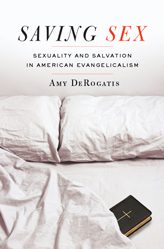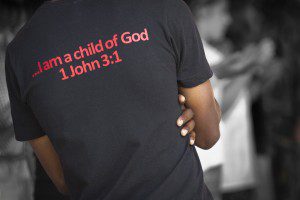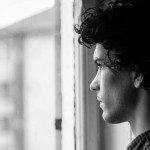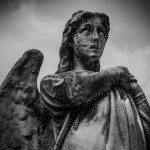“The biggest misconception is that evangelicals are anti-sex. They are not. Contrary to popular stereotypes that characterize conservative Christians as prudes, since the 1960s evangelicals have been engaged in an enterprise to claim and affirm the joys of sex for married born-again Christians.” — Amy DeRogatis, author, Saving Sex: Sexuality and Salvation in American Evangelicalism
This month at the Patheos Book Club, we’re talking about the new book Saving Sex: Sexuality and Salvation in American Evangelicalism by Amy DeRogatis. DeRogatis is an Associate Professor of Religion and American Culture in the Department of Religious Studies at Michigan State University and the author of Moral Geography: Maps, Missionaries, and the American Frontier. Here, she shares about her fascination with evangelical sex manuals and the broader topic of the role of sexuality in religious belief and practices.
 How did you become interested in the topic of evangelicals and sex?
How did you become interested in the topic of evangelicals and sex?
My interest in this topic began when I was asked a question by a student in my Religion and Gender class at Michigan State University (MSU). In the course we had been reading a book that discussed some ritual practices around marital sexuality in Orthodox Judaism. One student raised her hand and asked, “Where do Christians go to read about the proper ways to have sex?” Knowing the student, I understood that she didn’t mean all Christians; she was referring specifically to evangelicals. I made a quick reply about evangelicals publishing lots of material about how not to have sex and returned to the topic of discussion. The question stuck with me and after class I ran a few Internet searches for Christian sex manuals, and I found some Catholic writings. I then refined the search to evangelical sex manuals, and although I was unable to find any secondary material, such as a scholarly article that surveyed and analyzed the literature, I did eventually find lots of primary sources. I was astonished to discover that Special Collections in the Main Library at MSU had a large collection of these publications. Within a week of hearing the student’s question, I was in the library reading evangelical sex manuals, and I was hooked.
Did you know from the start that your research would lead to a book?
No, but I had a hunch that the research would lead me in the direction of some type of scholarly output, whether an article, book, or film-based project. Over the years that I worked with this literature, the book took many forms. At one point I had considered writing a book in which each chapter was devoted to a different type of evangelical prescriptive literature around families with marital sex being one chapter of the book. I spent one summer reading childrearing manuals and drafted a chapter. By the end of the summer I realized that my interest was in evangelical literature about sexuality and the specific ways that writers encourage a demonstration of belief through embodied sexual practices—either refraining from illicit sex or participating in sanctioned sex.
How do you define “evangelical” in this book?
That is a great question. There has been much debate among scholars about how to define evangelicalism and whether there is even a cohesive category under which we can talk about and study evangelicals. I adopt a very broad definition. I define evangelicals as Protestants who affirm the necessity of individual spiritual rebirth. Evangelicals emphasize personal conversion, the authority of Scripture, the imminent return of Christ, and the desire to spread the gospel. Evangelicals express their theological beliefs through daily practices such as prayer, Bible study, refraining from sinful behavior and furthering what is often called “their walk with Christ.”
Sexuality is a huge topic. Is there anything you planned to write about that you didn’t include in the book?
Yes, of course. The first question I usually am asked about is why I focus on heterosexuality in my book. Originally I had planned to write a chapter on prescriptive literature about same-sex desires and practices. There are a few recent books that do an excellent job of examining this issue (here I’ll just mention two: Tanya Erzen’s, Straight to Jesus and Lynne Gerber’s The Straight and Narrow) and I felt that I did not have much to add to or improve their excellent analyses. When I wrote the book proposal I was imagining a chapter on LGBTQ evangelicals and their writings about sexuality. But, as the project developed, I focused in on conservative evangelicals, and to me, what is one of the fascinating points that evangelical sex writers are deeply concerned with monitoring and regulating heterosexual sex.
What do you think is the biggest misconception about evangelicals and sexuality?
The biggest misconception is that evangelicals are anti-sex. They are not. Contrary to popular stereotypes that characterize conservative Christians as prudes, since the 1960s evangelicals have been engaged in an enterprise to claim and affirm the joys of sex for married born-again Christians. Rather than turning away from the sexual liberation movement, they have simply made it their own by publishing sex manuals, running sex workshops, and holding counseling sessions to aid married evangelicals achieve sexual satisfaction. The sex publications are distinct from secular sex manuals in their exclusive focus on heterosexuality, the assumption of virginity prior to marriage, the role of the Bible as a reliable guide for sexual pleasure, and the emphasis on understanding and maintaining traditional gender roles as a requirement for “true” sexual satisfaction. The authors go to great lengths to suggest techniques for sexual pleasure and argue that marital sexual pleasure is biblical and good marital sex is a sign of faithfulness and a testimony to others. It is true—evangelical publications do not promote all forms of human sexuality. It is also true that within heterosexual marriage, sexual pleasure, according to these manuals, is part of God’s plan for humanity. So, no, evangelicals are not anti-sex.
What was the most challenging part of your research?
The most challenging part for me was knowing when to stop the research and start writing. While working on this book, it seemed to me that every few days there was a news story or a new blog entry about evangelicals and sexuality. It might be an article about a sex scandal, or a promotion for a new book written by an evangelical on sexuality, or new youth group promoting a purity rally. I collected a tremendous amount of information and sometimes it felt like I would never see the end. Eventually, I decided I had to stop the research and live with the knowledge that as soon as I handed in the manuscript, something new would happen that was directly related to my topic. I was right. Soon after the manuscript was completed the Supreme Court heard oral arguments for what came to be known as the Hobby Lobby case. While the arguments and decision of the case wouldn’t have changed anything in my book, I might have incorporated some of the decision in Chapter 4 “Be Fruitful and Multiply” that discusses evangelical “pro-natalist” writing and the anti-contraception movement.
What is the pro-natalist movement? Is that a Protestant version of Natural Family Planning?
Yes, some pro-natalists follow Natural Family Planning, meaning refraining from sexual activity during the most fertile days of a woman’s reproductive cycle. I focus on pro-natalists who reject all forms of contraception and human intervention in reproduction. These pro-natalists argue that God should determine the number of children in each family and that any interference (either by contraception or refraining from marital intercourse) is selfish and contrary to God’s will. They contend that restricting contraception ultimately limits the overall number of godly children who when grown will transform the sinful society and usher in the kingdom of God.
Do you have a specific audience in mind?
Yes, everyone. I hope to reach both the scholarly community and the general public. I wanted to write a book that the could be used in an undergraduate classroom as well as by religious groups—both evangelical and nonevangelical—to encourage discussion about the role of sexuality in religious belief and practices.
How do you think your book will influence your scholarly field?
First and foremost, I hope that my book will put the study of evangelical sexuality on the scholarly agenda. Before I began publishing my research on evangelicals and sexuality there were very few scholarly essays about evangelicals and sexuality. The most compelling writings were focused on evangelical responses to same-sex desires and practices, not on heterosexuality. There were some popular magazine articles and a couple of books written by scholars outside of the field of religious studies that primarily focused on gender or sexuality and discussed evangelical sexual writings and practices as part of a larger project. While there are numerous excellent monographs on American evangelicals and gender, I am not aware of anyone who has written a scholarly study of American evangelical popular prescriptive literature about heterosexual practices. The one exception would be a few monographs that examine adolescent sexuality and the purity movement. I hope that my book will influence future scholars to take up the topic and investigate areas that I do not consider in this book. I know that there are a few dissertations in the works that focus on social media, more controversial sexual practices, a specific figure (Mark Driscoll currently is a favorite), as well as a few sociological and anthropological studies that consider the effects of the prescriptive literature I examine on the lives of everyday believers. Beyond my topic, I hope my book will inspire other scholars who study religion to take seriously popular literature about embodied practices and the role of the senses in the construction and maintenance of religious identity.
Can you say something about your next research project?
In my next project I have returned to the nineteenth century, the time period of my first book Moral Geography: Maps, Missionaries and the American Frontier. The book, Mormon King, will tell the story of the Mormon prophet James Jesse Strang who claimed to be the rightful successor to Joseph Smith. Strang saw and spoke with angels, found golden plates with new scripture, and received a highly contested letter of appointment from Joseph Smith. He eventually convinced over 12,000 people of his rightful position and led 2500 people to Beaver Island in Lake Michigan where he established a kingdom. While on Beaver Island, he crowned himself king, built a temple, established the Law of the Lord, and instituted plural marriage. He petitioned the Michigan State Legislature in Lansing to shift voting lines based on changed demographics and was subsequently elected to the Michigan House of Representatives two times. There are still Strang descendants living in Michigan, and I have had the opportunity to interview his great, granddaughter who descends from the youngest child of Strang’s first plural wife. Besides being a fascinating American religious history subject, for me, it has the added benefit of local significance.
What was the last book you read for pleasure that you would recommend to others?
Dear Committee Members: A Novel by Julie Schumacher.
Read an excerpt from Saving Sex at the Patheos Book Club here.












